
OSTEUROPA
Scope & Guideline
Deepening Insights into a Complex Landscape
Introduction
Aims and Scopes
- Political Analysis and Critique:
The journal delves into the political climate of Eastern Europe, exploring themes of authoritarianism, governance, and civil rights, particularly in the context of Russia, Ukraine, and neighboring states. - Cultural Studies and Representation:
It highlights the cultural dimensions of Eastern European societies, examining literature, arts, and media as reflections of political realities and social struggles. - Historical Contextualization:
The journal emphasizes the importance of historical narratives in understanding current events, offering scholarly insights into the legacies of Soviet rule, imperialism, and national movements. - Human Rights and Repression:
A significant focus is placed on human rights issues, including state repression, censorship, and the experiences of marginalized communities within Eastern Europe. - Geopolitical Dynamics:
The journal analyzes the geopolitical relations within Eastern Europe and beyond, particularly the interplay between Russia, the West, and regional powers.
Trending and Emerging
- Authoritarianism and State Repression:
There is a marked increase in publications addressing the rise of authoritarian regimes and the mechanisms of state repression, particularly in Russia and Belarus, reflecting current political realities. - War and Conflict Studies:
The ongoing war in Ukraine has catalyzed a surge of scholarly interest in conflict studies, focusing on the implications of war for national identity, societal resilience, and geopolitical stability. - Nationalism and Identity Politics:
Emerging research emphasizes the resurgence of nationalism and its implications for ethnic minorities and regional identities, particularly in the context of Russian imperialism and its impact on neighboring states. - Cultural Resistance and Expression:
The journal has increasingly highlighted cultural expressions of resistance, including literature and arts that critique state narratives and promote alternative voices amid repression. - Environmental and Humanitarian Issues:
Recent articles have begun to explore the environmental consequences of conflict and authoritarianism, alongside humanitarian crises, indicating a broader understanding of the interconnectedness of these issues.
Declining or Waning
- Post-Soviet Economic Transitions:
The early 2000s saw significant interest in the economic transitions of post-Soviet states, but this focus has diminished as attention has shifted towards immediate political crises and human rights issues. - Historical Reconciliation Efforts:
There was once a robust discourse surrounding reconciliation and memory politics in Eastern Europe, particularly concerning World War II and Soviet history, but this has waned as contemporary conflicts take precedence. - Regional Cooperation Initiatives:
Interest in discussions about regional cooperation and integration among Eastern European states has declined, overshadowed by rising nationalism and geopolitical tensions. - Civic Engagement and Activism:
While civic engagement was a focal point in earlier publications, recent themes have shifted more towards state repression and authoritarian responses, leading to less emphasis on positive narratives of activism.
Similar Journals

Russian Politics
Illuminating the Intersections of Culture and Governance in RussiaRussian Politics, published by BRILL, is a leading interdisciplinary journal that delves into the complexities of political dynamics, cultural influences, and historical contexts within Russia and beyond. With an ISSN of 2451-8913 and an E-ISSN of 2451-8921, this journal has gained significant recognition, achieving a Q1 ranking in both Cultural Studies and History, as well as a Q2 ranking in Political Science and International Relations and Sociology for 2023. The journal, located at PLANTIJNSTRAAT 2, P O BOX 9000, 2300 PA LEIDEN, NETHERLANDS, serves as an essential platform for scholars, practitioners, and students, offering cutting-edge research and discussions on the political landscape and societal trends within Russia. With a commitment to comprehensive scholarship and a wide-ranging scope, it is positioned as more than just a publication; it is a vital resource for anyone seeking to understand the intricate tapestry of Russian politics.
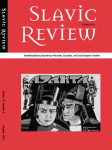
SLAVIC REVIEW
Unveiling the Richness of Slavic Studies.SLAVIC REVIEW, published by Cambridge University Press, is a prominent academic journal that delves into the rich tapestry of Slavic studies, focusing on the cultural, historical, and social dimensions of Slavic regions. With an ISSN of 0037-6779 and an E-ISSN of 2325-7784, this journal holds a significant position within the academic community, ranking in the Q2 category of Arts and Humanities (miscellaneous) and achieving a Q1 rating in Cultural Studies as of 2023. Notably, the journal has consistent relevance in the field, as evidenced by its Scopus rankings—Rank #260 in Cultural Studies and Rank #204 in Miscellaneous Arts and Humanities. Since its converged years starting from 1966 up to the present, SLAVIC REVIEW has been an essential resource for researchers, professionals, and students aiming to deepen their understanding of Slavic cultures. While it operates on a traditional subscription model and does not provide open access, the journal remains a vital platform for pioneering research and critical discourse in Slavic studies.

Intersections-East European Journal of Society and Politics
Navigating the Intersections of Society and Politics in Eastern EuropeIntersections-East European Journal of Society and Politics is a pivotal resource in the fields of Law, Sociology, and Political Science, published by the prestigious CENTRE SOCIAL SCIENCES, HUNGARIAN ACAD SCIENCES. Since its inception in 2015, this journal has been dedicated to exploring the complexities of social and political phenomena within Eastern Europe, making it an essential platform for scholars, practitioners, and students alike. With a focus on fostering interdisciplinary dialogue, it publishes innovative research that critically addresses pressing societal issues and challenges. Despite its current quartile ranking of Q3 in both Law and Sociology and Political Science, the journal's commitment to high-quality scholarship is evident through comprehensive peer-review processes. Accessible to a global audience, this journal aids in the dissemination of vital knowledge and serves as an invaluable asset for anyone seeking to advance their understanding of East European socio-political dynamics.
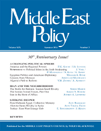
MIDDLE EAST POLICY
Navigating the Political Landscape of the Middle EastMIDDLE EAST POLICY stands as a notable journal in the fields of Political Science and International Relations, published by Wiley in the United Kingdom. With a rich publication history dating back to 1992, this journal provides a critical platform for scholarly exploration and dialogue surrounding Middle Eastern political dynamics and policies. It ranks in the Q3 category in the 2023 evaluations for both Political Science and International Relations and Sociology, indicating its influential role in these academic fields. While it does not offer open access, it is recognized for its rigorous peer-reviewed articles that contribute valuable insights and analyses on pressing regional challenges and institutional frameworks. Researchers, professionals, and students engaged in Middle Eastern studies will find MIDDLE EAST POLICY essential for understanding the complex socio-political landscapes of the region and for fostering informed discussions that advance both scholarship and practice.

European Journal of Transformation Studies
Innovating Perspectives on Socio-Economic EvolutionThe European Journal of Transformation Studies is a distinguished peer-reviewed publication focusing on the multifaceted field of transformative processes across Europe and beyond. Published by EUROPE OUR HOUSE in Tbilisi, Georgia, this journal serves as a vital platform for researchers, academics, and professionals to share insights into socio-economic, cultural, and technological transformations in contemporary societies. Although the journal operates under an open-access model, ensuring wider dissemination of knowledge, it aims to cultivate a rich discourse around transformation studies by presenting innovative research, theoretical advancements, and case studies that reflect the evolving landscape of Europe. With its commitment to advancing understanding in this critical field, the European Journal of Transformation Studies is poised to become an essential resource for scholars and practitioners alike, encouraging interdisciplinary collaboration and fostering new perspectives on transformation.

Istorija
Fostering Dialogue Through Historical InsightIstorija is a distinguished academic journal published by Vytautas Magnus University Education Academy, focusing on historical research and discourse. With its ISSN 1392-0456 and E-ISSN 2029-7181, the journal aims to disseminate high-quality scholarly articles that explore various facets of history, catering to an audience of researchers, educators, and students alike. Although currently not open access, Istorija remains committed to advancing historical scholarship by contributing valuable insights and fostering academic dialogue through an inclusive editorial process. Set against the backdrop of Vilnius, Lithuania, the journal engages with both regional and international historical narratives, making it a pivotal resource for those looking to deepen their understanding of historical events, methodologies, and interpretations. Whether you are a seasoned historian or a burgeoning scholar, Istorija offers a platform for the exploration and exchange of innovative ideas and research within the discipline.
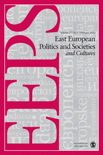
EAST EUROPEAN POLITICS AND SOCIETIES
Fostering scholarly exchange on the evolution of Eastern Europe.EAST EUROPEAN POLITICS AND SOCIETIES, published by SAGE Publications Inc, stands as a vital academic resource within the fields of sociology and political science, focusing primarily on the dynamics and transformations of Eastern Europe. With an ISSN of 0888-3254 and an E-ISSN of 1533-8371, this quarterly journal has been contributing to scholarly discourse since 1986 and continues to be a crucial platform for the exchange of innovative research and critical insights, boasting a commendable Q2 ranking in its category as of 2023. Researchers, professionals, and students engaged in the exploration of post-socialist transitions, identity politics, and socio-economic challenges will find this journal an essential tool for understanding the complexities of the region. While the journal offers limited open access options, its presence in academic databases ensures that cutting-edge research remains accessible to a broader audience. With a Scopus rank of #606 out of 1466 in the social sciences category, EAST EUROPEAN POLITICS AND SOCIETIES continues to shape the intellectual landscape and discourse surrounding Eastern Europe.
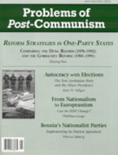
PROBLEMS OF POST-COMMUNISM
Illuminating the Pathways of Political ChangePROBLEMS OF POST-COMMUNISM is a distinguished academic journal focused on the critical examination of political, social, and economic transformations in post-communist societies. Published by Routledge Journals, Taylor & Francis Ltd, this journal features an ISSN of 1075-8216 and an E-ISSN of 1557-783X. With an impressive ranking of Q2 in the fields of Sociology and Political Science, and a Scopus position of #290/1466 (80th percentile), it stands as a vital resource for researchers and practitioners alike. The journal spans a convergence of years from 1996 to 2024, offering a rich archive of scholarship. Although it does not currently provide open access options, its rigorous peer-reviewed articles delve into the intricate dynamics shaping post-communist states, making significant contributions to contemporary academic discourse. Addressed to an audience keen on understanding the societal shifts and challenges facing these regions, PROBLEMS OF POST-COMMUNISM is essential for anyone seeking insightful analyses and robust dialogue in this evolving field.

Romanian Journal of Political Science
Advancing Knowledge in Political ScienceThe Romanian Journal of Political Science, published by the Romanian Academy of Sciences, is a vital resource for researchers, professionals, and students interested in the fields of political science and international relations. This journal, carrying the ISSN 1582-456X, has established itself within the academic community through its focus on contemporary issues and innovative research methodologies. Although its coverage in Scopus was discontinued after 2022, the journal remains a significant contributor to discussions surrounding political dynamics in Romania and beyond, classified in the Q4 category for both political science and sociology as of 2023. With a national focus and international relevance, it offers insights into regional political contexts and societal transformations, making it an essential reading for anyone looking to deepen their understanding of these disciplines. The journal is dedicated to promoting rigorous scholarly work and fostering an engaging platform for interdisciplinary dialogue.
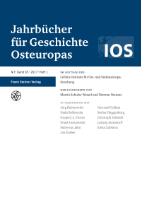
JAHRBUCHER FUR GESCHICHTE OSTEUROPAS
Connecting the Dots of Eastern Europe's Historical LandscapeJAHRBUCHER FUR GESCHICHTE OSTEUROPAS, published by FRANZ STEINER VERLAG GMBH, is a prominent academic journal dedicated to the exploration of Eastern European history. With its inception dating back to 1978, this journal has consistently provided a platform for scholarly discourse, contributing significantly to the understanding of the region's complex historical narratives. While the journal is not open access, it holds a solid reputation within the academic community, positioned in the Q4 quartile in history as per the 2023 category rankings, and stands at Rank #1636 within the Scopus Arts and Humanities History ranking. The convergence of its publication years throughout the decades emphasizes a long-standing commitment to historical research, thereby making it an essential resource for researchers, professionals, and students interested in Eastern European studies. Explore the intricate dynamics of historical events and cultural developments that shape Eastern Europe through this invaluable periodical.